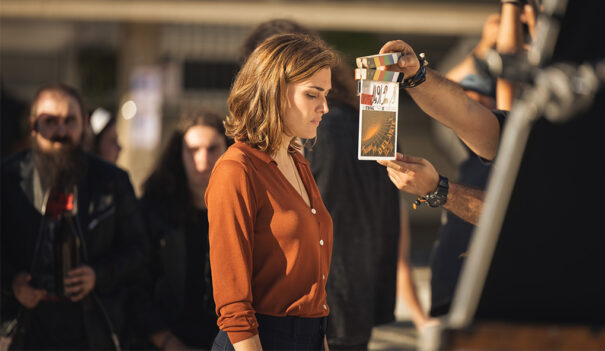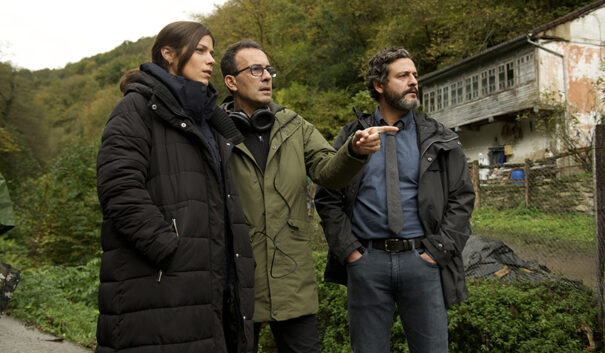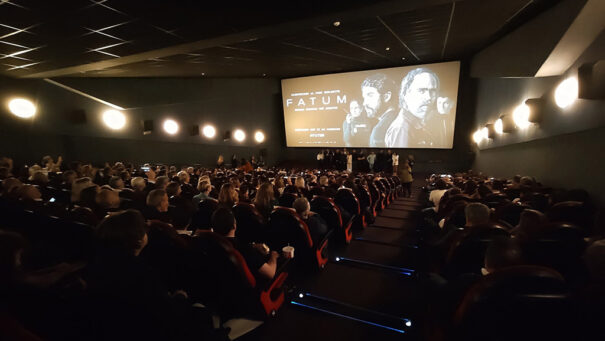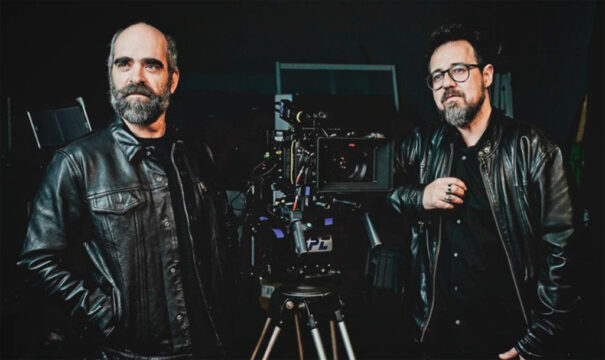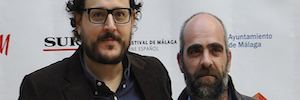Vaca Films: 20 años en el cine, un futuro en la ficción televisiva
Borja Pena, fundador de Vaca Films, hace balance de los primeros 20 años de trayectoria de la productora gallega y aborda su futuro, que estará profundamente marcado por el impacto de la nueva ficción televisiva.
Celda 211, Cien años de perdón, Código Emperador, El desorden que dejas, El niño, Extinction, Fatum, Hasta el cielo, Infiesto, La unidad o Quien a hierro mata son solo unos pocos ejemplos del legado audiovisual que Vaca Films está dejando en la industria española desde que fundada en 2003 por Borja Pena y Emma Lustres.
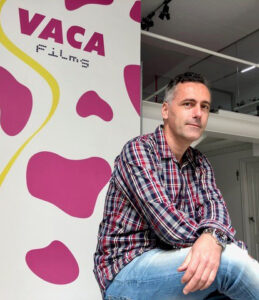 Llevando el cine por bandera, a 20 años de su fundación, ha conseguido múltiples hitos en forma de galardones e identidad. El thriller es el estandarte que porta y que sigue explorando con una producción anual que arroja una media de cuatro grandes proyectos.
Llevando el cine por bandera, a 20 años de su fundación, ha conseguido múltiples hitos en forma de galardones e identidad. El thriller es el estandarte que porta y que sigue explorando con una producción anual que arroja una media de cuatro grandes proyectos.
Durante estas décadas, y especialmente en el último lustro, ha cambiado el tablero de juego en el que Vaca Films acostumbraba a jugar. La decadencia de la distribución cinematográfica a favor de las plataformas de vídeo bajo demanda, unida a una apuesta por los formatos seriales premium, han conducido a la productora gallega a redefinir su identidad. Y es que la etiqueta de productora cinematográfica, otrora símbolo de saber hacer, prestigio y peso, quizá hoy describe mejor un sentimiento de romanticismo y resiliencia.
El 20 aniversario de Vaca Films y este apasionante contexto permite que Borja Pena comparta impresiones, reflexiones y preguntas sin resolver sobre la realidad que acompaña a la producción audiovisual española.
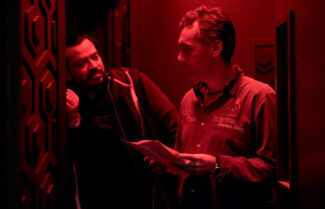 Vaca Films cumple en 2023 dos décadas de vida. ¿Han cumplido los objetivos que se plantearon en la génesis del proyecto?
Vaca Films cumple en 2023 dos décadas de vida. ¿Han cumplido los objetivos que se plantearon en la génesis del proyecto?
Podemos decir que todas las metas que Emma y yo nos pusimos cuando montamos la empresa hace 20 años los hemos conseguido hace tiempo; éramos muy jóvenes y los objetivos no eran superambiciosos. Básicamente, queríamos hacer películas desde Galicia para España, pero también con posibilidades de que fueran vistas fuera por su temática y calidad. También pretendíamos ser una de las productoras referentes en el sector cinematográfico en España.
Empezamos colaborando mucho con otras productoras, y cuando ya adquirimos la experiencia necesaria y teníamos un bagaje en el sector, comenzamos a liderar nuestros propios proyectos, a hacer las películas mucho más nuestras y a hacer un tipo de cine con su propio sello.
Una de las claves de la productora fue la decisión de hacer cine en Galicia sin necesidad de utilizar Madrid o Barcelona como hub. ¿Cómo ha evolucionado la producción desde Galicia en este tiempo?
Vaca Films está en Galicia desde hace veinte años y no nos hemos movido en gran medida porque siempre ha existido un apoyo a nuestro sector que sigue ahí. Desde el comienzo, fueron muy útiles para conseguir entrar en proyectos y, después, para que estos fueran más competitivos; mejores, más grandes y más interesantes para el público. Además, no hay que olvidar que aquí hubo pioneros antes de nosotros que abrieron este sector, así como una televisión que también nos ha apoyado mucho.
¿La industria se ha desarrollado hasta tal punto que pueden ser “independientes” del resto del territorio?
En Galicia se pueden hacer películas de primer nivel y de primera calidad en el entorno del audiovisual español. Si bien es cierto que no tenemos todos los técnicos que podríamos necesitar para cubrir todas nuestras necesidades, sí que tenemos una gran mayoría. Esto también se extiende a los actores, ya que hay mucho talento derivado del teatro gallego que da opciones de mucho nivel. Dicho esto, y aunque nos encontramos en un momento de mucha madurez en el que somos capaces de rodar nuestras películas donde el guion lo pida, siempre intentamos traer todo lo que podemos para aquí. Primero, por compromiso con nuestro sector; segundo, por nuestra comodidad personal y conciliación, y tercero, porque rodar aquí nos es mucho más económico. En ciudades como Madrid tienes que pagar muchísimo dinero por cosas que aquí son gratis o prácticamente gratis.
Lecciones tras dos décadas
Echando la vista atrás, ¿identifica algún conocimiento clave con respecto a la producción adquirido tras años de experiencia en el sector?
A lo largo de los años vas cogiendo tips que son útiles después en cada proyecto. El primero que se me viene a la mente es ser honesto con la gente con la que estás haciendo las películas. Los rodajes son un sinfín de problemas y de renuncias a cosas que te gustaría hacer, pero que no puedes. Por eso, es muy importante dialogar con los directores y los cabezas de equipo, que como es natural siempre querrán más. En su ADN está el querer hacerlo mejor y nosotros tenemos el papel de ir ayudando a decidir por dónde tirar cuando no se dan las circunstancias para conseguir todo lo que te propones. Eso es algo muy importante. Pero sí, sí que tengo la sensación de que, con el paso de los años, somos capaces de hacer mejores películas o series con menos cosas, ya que somos capaces de aprovechar los medios mejor y ayudar a los directores en el día a día de los rodajes.
He fenómeno de las plataformas nos ha cogido en un buen momento.
Vaca Films tuvo en 2022 uno de los mayores años de actividad de su historia. ¿Es la recompensa del saber hacer de años de trayectoria o existe otra explicación para este fenómeno?
Creo que la razón fundamental fue que tuvimos un 2020 y 2021 muy enfocados en el desarrollo de proyectos. Poco a poco fueron fructificando, en gran medida impulsados por el boom de las plataformas, que se han metido a producir, básicamente, series. Este año tampoco vamos desencaminados, ya que también vamos a rodar dos series, estamos con el rodaje de una película y seguramente comencemos otro más antes de que termine el año. Y, a esto, se suman los estrenos y las postproducciones que arrastramos del año pasado. Al final, el fenómeno de las plataformas nos ha cogido en un buen momento, en el que estábamos asentados dentro de las producciones cinematográficas, y nos ha venido bien para aumentar los volúmenes de producción.
Las plataformas lo cambian todo
Vuestro primer proyecto para plataformas fue La Unidad, para Movistar Plus+. Después, han venido otros tantos. ¿Cómo se desarrolló esta apertura de puertas hacia el mundo de la ficción televisiva?
Surgió de una forma muy natural. Hace unos años, cuando las plataformas empezaron a producir series en España, muchas de ellas se fijaron en productoras de cine, porque querían hacer productos con esa calidad cinematográfica; como es lógico, hacer algo diferenciador para el público que paga una cuota todos los meses. Nosotros tuvimos conversaciones con varias, algunas de ellas ni siquiera propiciada por nosotros, y conversación tras conversación se fueron fraguando los diferentes proyectos. No es algo que sea típico nuestro, sino que les ha pasado a otras productoras que están muy ocupadas en el mercado del cine y, ahora también, en el de la televisión.
He mercado cinematográfico está como está: la mayor parte de las películas no acaban de arrancar y funcionar bien.
¿Qué importancia tiene actualmente la ficción televisiva en el core del negocio de Vaca Films?
A nivel de volumen, aunque el año pasado fue parejo, este año la televisión ya es mayor que el cine. Una serie de las que hacemos nosotros es, prácticamente, como hacer dos o tres películas. Estamos inmersos en ficciones de presupuestos muy altos con muchos recursos y eso hace que la balanza se decline hacia el lado de la televisión. Además, desafortunadamente, el mercado cinematográfico está como está: la mayor parte de las películas no acaban de arrancar y funcionar bien, y el cine se está quedando en un reducto para el cine más familiar y para los blockbusteres. Eso, unido a que las plataformas están demandando originals cada vez en mayor número, me lleva a pensar que la televisión tendrá aún más peso en nuestra empresa. Pero bueno, veremos cómo mejora la ventana del cine y si consigue recuperar a ese público más adulto que parece que ha abandonado las salas.
Salas de cine: ¿supervivencia o agonía?
¿Por dónde cree que puede pasar la solución para la supervivencia de la distribución cinematográfica en salas?
La situación actual parte de una suma de factores, pero básicamente lo principal es que la gente adulta tiene una oferta tan grande a su alcance en su casa que el hecho de ir a ver una película a una sala de cine tiene que suponerle algo muy especial, y la mayor parte de las películas no consiguen llegar a crear al espectador esa necesidad. Antes no tenías 10 videoclubs a golpe de mano de televisión en tu salón, y ahora lo tienes. Además, la mayor parte de las semanas con cosas muy buenas, llámese series o llámese películas. A partir de ahí, ¿cómo podríamos llegar a conseguir que la gente vaya a ver nuestras películas? Lo primero, haciendo nuevas propuestas lo suficientemente ambiciosas y atractivas como para que paguen por hacerlo, pero eso conlleva inversiones económicas muy grandes por parte del sector que nunca podrán igualar la que hacen los estudios americanos.
¿Los modelos de negocio de acceso ilimitado a sesiones de cine a cambio de un abono mensual, que acaban de llegar a España, podrían ser una solución?
Tengo mis serias dudas de que eso vaya a funcionar y realmente suponga un cambio, básicamente porque en Estados Unidos ya se probó en su día el famoso MoviePass y no funcionó. Después, no tengo del todo claro a quién va dedicado este producto. La gente que va dos o tres veces al mes al cine acaban dejándose más o menos la misma cantidad que con el paso mensual. Por otro lado, la gente que es muy fan del cine le viene muy bien este instrumento, pero es que esta gente ya iba al cine: igual antes pagaba 30 euros al mes y ahora va a ir más veces pagando 18. Sí, van más veces a las salas, ¿pero generará valor suficiente para que en términos económicos se recupere lo que se deja de ganar por las entradas? Tengo mis dudas, pero ojalá el pase funcione. Lo que también tiene que suceder es que las cadenas sean honestas con el resto de los operadores del sector, empezando por los distribuidores y acabando por los productores para que, si realmente se genera más dinero, sea en beneficio de todos.
Estamos empezando a financiar las películas incluyendo en las financiaciones los gastos de lanzamiento en las salas de cine y asumiendo que igual van a pérdidas.
¿Cree que en la actualidad una productora como Vaca Films puede sobrevivir sin las salas de cine, explorando nuevas vías de distribución a través de las plataformas de distribución digitales?
Sí, claro, indudablemente. Una cosa no tiene que ver con la otra. Para nosotros, las salas de cine siempre supusieron un valor adicional para la financiación de las películas, que no dejaba de ser muy jugoso cuando las películas tenían grandes taquillas. Ahora mismo, estamos en un sistema en el que la financiación con las plataformas, televisiones y agentes internacionales te hace no tener que depender en absoluto de lo que pasa en las salas. Es más, nosotros estamos empezando a financiar las películas incluyendo en las financiaciones los gastos de lanzamiento en las salas de cine y asumiendo que igual van a pérdidas. El estreno en salas cumple otras funciones: es la forma de darle notoriedad a la película y que todos los partners que han participado queden satisfechos con el producto; que todo tenga un digno lanzamiento. Ese es el modelo actual y a corto plazo te diría que seguirá siendo así. Por desgracia, la recuperación de las taquillas para cierto tipo de películas españolas de nivel medio-medio alto va a ser muy complicado.
Tecnología, plató virtual y Vaca Films
Vaca Films cuenta con varias estaciones de montaje. ¿De qué forma se utilizan estos espacios?
Las estaciones de montaje estuvieron motivadas por el volumen de las series de televisión. Los rodajes son muy largos y se requieren varias estaciones y personas trabajando al mismo tiempo. Nosotros tenemos tres estaciones completas que la utilizamos exclusivamente para nuestros proyectos; no las solemos alquilar, ya que es difícil cuadrar los tiempos; incluso se nos están haciendo cortas. Si te metes a hacer televisión, los equipos se amortizan rápido.
¿Valora ampliar sus capacidades de postproducción con un espacio para el etalonaje?
El tema del color es otro cantar, ya que yo creo mucho más en las personas que están detrás de las máquinas que en las máquinas en sí. El color requiere de un tratamiento muy especial y a nosotros nos gusta trabajar con los mejores etalonadores que hay en este país, quienes suelen estar en estudios con mucho volumen de trabajo. Por ello, dudo que nos animemos a comprar equipos de color porque, aunque lo podríamos hacer, lo que buscamos es trabajar con los mejores profesionales.
Estamos metidos en una iniciativa con otros productores gallegos en la que prevemos la construcción de unos platós en La Coruña muy punteros.
Para el resto de las cuestiones técnicas, ¿Vaca Films sigue confiando en proveedores externos?
Así es, pero sí puedo decir que estamos metidos en una iniciativa con otros productores gallegos en la que prevemos la construcción de unos platós en La Coruña muy punteros, incluyendo un plató virtual.
¿Cuáles son las claves de este proyecto?
Esta iniciativa en la que nosotros hemos participado desde el inicio incluye la construcción de un plató virtual muy puntero, que ya tiene unos fondos asignados por parte de la Diputación de La Coruña y el gobierno de España, a través de las ayudas del Hub Audiovisual, de 7 millones de euros. Ya se está trabajando en él con vistas a tenerlo operativo el próximo año. Además de eso, también se han proyectado un par de platós muy grandes de 1500 metros cuadrados para dar servicio a todos los rodajes que se necesiten. Todas estas infraestructuras estarán en la Fábrica de Armas de Santa Bárbara, una zona a cinco minutos del centro de La Coruña y el aeropuerto de la ciudad. Estas instalaciones punteras, unidas a las ayudas que hay en Galicia para atraer rodajes de fuera, hace que el territorio aún sea más interesante de lo que era antes.
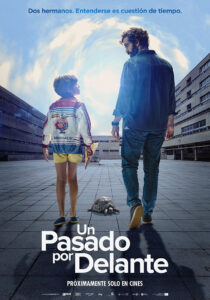 La nueva televisión, en el core de Vaca Films
La nueva televisión, en el core de Vaca Films
¿En qué proyectos está trabajando Vaca Films de cara a 2023 y 2024?
Ya hemos estrenado para Netflix Infiesto, un original, en febrero, y la serie Hasta el Cielo en el mes de marzo, que está yendo muy bien en la plataforma. Hace unas semanas hemos estrenado el largometraje Fatum, y estamos en producción de una serie llamada Clanes, que se rodará próximamente También estamos rodando una película bastante grande y ambiciosa en Madrid que todavía no se ha anunciado. Además, estamos con una serie documental para Prime Video de El circo de los muchachos, un proyecto dirigido por Elías León Siminiani. En verano, estrenaremos Un pasado por delante, una película familiar de esas que todavía funcionan en el cine [risas]. Y, además, estamos trabajando en tres o cuatro películas, y alguna serie más, para el próximo año.
En el futuro cercano, ¿Vaca Films pasará a ser una productora más serial que cinematográfica?
Creo que seguiremos combinando las dos cosas, si bien es cierto que las series cada vez nos interesan más, porque nos gusta mucho hacerlas, por la narrativa que permiten desarrollar y porque contamos con socios y plataformas con las que trabajamos muy cómodos. Entonces, me cuesta mucho ver para qué lado se decantará la balanza, porque, así como hace años te decía que siempre haremos más cine y películas que televisión, la realidad es que hoy en día las narrativas adultas están más en televisión que en cine. Además, seguro que haremos muchas películas también, pero para televisión. Por ahora, seguiremos volcados en hacer proyectos que a nosotros nos apasionen, nos gusten y que valga la pena que le dediquemos dos, tres o cuatro años de nuestra vida.
An interview by Sergio Julián Gómez
Did you like this article?
Subscribe to our RSS feed and you won't miss anything.
• Section: Cine, Cinema / Production, Interviews, Reports, Television, TV Production




